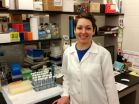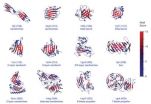(Press-News.org) Obesity and diabetes are among the fastest growing health problems in the world, and the hunt is in for a pill that can fight the problem. Now a Danish/British team has come up with a smart tool that will speed up the scientific hunting process, and we may be one step closer to a pill against obesity.
The body has a variety of functions that decide if we get overweight or not. For instance hormones control our appetite and the uptake of food. In recent years science has taken on the quest of investigating these physiological functions and finding a medical way to fight obesity.
One way that has attracted scientific interest is to work with a special protein, that can stimulate different physiological activities such as the production of appetite controlling hormones and hormones that control the intestinal uptake of food.
The particular protein is found in the cell membranes in intestines, in immune cells and in fat, and it is called FFA4. The protein is activated by long-chain free fatty acids released from the food such as omega-3 fatty acids. When this happens, it releases hormones that inhibit our appetite and increase sugar uptake from the blood.
"In some people this protein is not activated and they have a much higher risk of becoming obese. This can be explained by the involvement of the protein in hormone secretion and regulation of inflammation and insulin sensitivity", explains postdoc Bharat Shimpukade from Department of Physics, Chemistry and Pharmacy at University of Southern Denmark.
Together with Professor Trond Ulven from the same department and colleagues from University of Glasgow he is the co-author of a new paper on the subject in The Journal of Biological Chemistry.
"We want to find a way to activate this protein, because that may help us to develop a drug against obesity or diabetes", says Bharat Shimpukade.
Molecules can activate proteins, so the job is "just" to find the right molecule.
1"But there is almost an infinite number of possible molecules that we can synthesize, and it is extremely time consuming to test molecules randomly for their possible ability to activate this particular protein", explains Bharat Shimpukade.
The job could therefore take years and years of painstaking experiments in laboratories – but this can now be avoided thanks to the new development by the research-team.
"We have developed a computer model of FFA4 that can help us to select the correct molecules for synthesis by first testing if they bind in the computer model. This way we can test thousands of molecules in a very short time before going into the laboratory. This will speed up the process of finding the right compounds that can be developed to efficient drugs against obesity or diabetes", says Bharat Shimpukade.
The model has been confirmed and refined by detailed experimental studies.
In 2012, the same team discovered the first selective activator of FFA4, a compound that is now important for studying the functions of the protein.
"It works well at activating the protein. But we cannot administer it as a drug to a patient, because it is not stable enough in the body. We need a more water-soluble molecule with higher stability: It must not be broken down in the body before it has done the job. On the other hand, we don't want it to stay in the body forever."
Bharat Shimpukade has now set out to find the winner-molecule that will activate the protein in all the right ways and stay in the body for the time needed. And of course he is using the new model.
"I have been looking for a couple of months now, and I hope to be able to continue till I find the perfect molecule that can lead to a new cure", says Bharat Shimpukade.
INFORMATION:
About the study:
This is the first detailed examination of the protein FFA4's binding site. In order to make their powerful model the researchers performed three kinds of studies: Molecular modelling, experimental mutations of the protein and studies of how different molecules interact with it. The experimental work with generating protein mutants and testing small molecules was done at University of Glasgow, while the computational protein analysis and the design and synthesis of small molecule activators was done at University of Southern Denmark.
FFA4 is a long-chain fatty acid receptor protein, previously known as GPR120, that has received substantial interest as a novel target for the treatment of obesity and diabetes, as well as related metabolic diseases. When activated FFA4 starts a number of potentially beneficial biological effects, such as: Stimulation of food uptake by the intestines, inhibition of appetite regulating hormones, stimulation of glucose uptake by fat cells, promotion of pancreatic cell-survival, improvement of insulin sensitivity.
About obesity:
Nearly 30 percent of the world's population is overweight or obese.
No countries have reduced their obesity rate in 33 years.
Highest rates are seen in Tonga, Samoa, Kiribati, Kuwait, Libya and Qatar.
Contact: Bharat Shimpukade. Mail: bharat@sdu.dk. Tel +45 65508418. Mobile +45 50366796
Ref: J Biol Chem. 2014 May 24. pii: jbc.M114.561449. [Epub ahead of print] The molecular basis of ligand interaction at free fatty acid receptor 4 (FFA4/GPR120). Hudson BD, Shimpukade B, Milligan G, Ulven T.
Scientists closing in on new obesity drug
2014-06-12
ELSE PRESS RELEASES FROM THIS DATE:
Children showing signs of social withdrawal in risk of internalized distress
2014-06-12
Children are showing signs of social withdrawal are more susceptible to parental influences than others. These children were also more prone to distress caused by the impacts of guilt-inducing parenting.
The researchers of the University of Jyväskylä, Finland, have found that children showing signs of social withdrawal are more susceptible to parental influences than others. The researchers followed up about 300 children across the first three years of primary school and monitored the children's social skills and problem behaviors. At the same time, mothers' and fathers' ...
Recreational football can treat hypertensive and type 2 diabetes patients
2014-06-12
The studies, published in the acclaimed Scandinavian Journal of Medicine & Science in Sports, show that 24 weeks of twice-weekly recreational football training sessions lower blood pressure and improves heart function in men with high blood pressure and men with type 2 diabetes. Furthermore, men with type 2 diabetes lost 12 % of their abdominal fat and reduced their blood sugar 20% more than inactive control subjects.
These effects are likely to reduce the risk of developing heart diseases including heart failure and myocardial infarction, and the participants had a reduced ...
Does food addiction exist?
2014-06-12
Women with weight problems were more impulsive than average in a food-related psychology test, a new research paper has shown. This suggested that they are more instinctively stimulated by images of food as well as lacking contemplative will power. Further, some women reported food craving even if they had eaten recently, a symptom of possible food addiction.
"All addictions are similar in that the sufferer craves to excess the feel-good buzz they receive from chemical neurotransmitters produced when they eat, gamble, smoke, have sex or take drugs," commented Claus Voegele, ...
Blood product sterilization taken too far?
2014-06-12
Certain processes used to sterilize blood products could potentially cause serious health issues in transfusion recipients, according to an international study published in the journal Platelets and led by Dr. Patrick Provost of Université Laval's Faculty of Medicine and the CHU de Québec Research Center. These processes purportedly alter the blood platelets to the extent of preventing them from carrying out their functions correctly and may be the cause of hemorrhages observed in patients having received treated blood.
The function of platelets goes far beyond their ...
When good people do bad things
2014-06-12
CAMBRIDGE, MA -- When people get together in groups, unusual things can happen — both good and bad. Groups create important social institutions that an individual could not achieve alone, but there can be a darker side to such alliances: Belonging to a group makes people more likely to harm others outside the group.
"Although humans exhibit strong preferences for equity and moral prohibitions against harm in many contexts, people's priorities change when there is an 'us' and a 'them,'" says Rebecca Saxe, an associate professor of cognitive neuroscience at MIT. "A group ...
Study of white sharks in the northwest Atlantic offers optimistic outlook for recovery
2014-06-12
White sharks are among the largest, most widespread apex predators in the ocean, but are also among the most vulnerable. A new study, the most comprehensive ever on seasonal distribution patterns and historic trends in abundance of white sharks (Carcharodon carcharias) in the western North Atlantic Ocean, used records compiled over more than 200 years to update knowledge and fill in gaps in information about this species.
Scientists from NOAA Fisheries and colleagues added recent unpublished records to previously published data to present a broad picture of 649 confirmed ...
Antibodies from the desert as guides to diseased cells
2014-06-12
The use of nanoparticles in cancer research is considered as a promising approach in detecting and fighting tumour cells. The method has, however, often failed because the human immune system recognizes the particles as foreign objects and rejects them before they can fulfil their function. Researchers at the Helmholtz-Zentrum Dresden-Rossendorf (HZDR) and at University College Dublin in Ireland have, along with other partners, developed nanoparticles that not only bypass the body's defence system, but also find their way to the diseased cells. This procedure uses fragments ...
Proliferation cues 'natural killer' cells for job change
2014-06-12
PROVIDENCE, R.I. [Brown University] —The immune system maintains a rich abundance of "natural killer" cells to confront microbial invaders, but as the body gains the upper hand in various infections it sometimes starts to produce even more of the cells. For three decades, scientists haven't understood what purpose that serves. In a new paper, Brown University researchers show one: proliferation helps change the NK cells' function from stimulating the immune response to calming it down, lest it get out of hand.
In a series of experiments now published online in the Journal ...
The transmission of information via proteins could revolutionize drug discovery
2014-06-12
Proteins are chains of amino acids that, when folded into certain structural patterns and also when unfolded, exert functions within cells. Proteins receive signals that are transmitted from one to the next and that are essential for life. However, within a given protein, are there "highways" along which the signals travel, like a in a relay event? That is to say, how is the information transmitted in a given protein? "This is one of the key questions in biophysics," says Xavier Salvatella, ICREA Professor at the Institute for Research in Biomedicine (IRB Barcelona) and ...
Tiny plants ride on the coattails of migratory birds
2014-06-12
Since the days of Darwin, biologists have questioned why certain plants occur in widely separated places, the farthest reaches of North American and the Southern tip of South America but nowhere in between. How did they get there? An international team of researchers have now found an important piece of the puzzle: migratory birds about to fly to South America from the Arctic harbor small plant parts in their feathers.
In the past several decades, scientists have discovered that the North – South distributions of certain plants often result from a single jump across the ...


